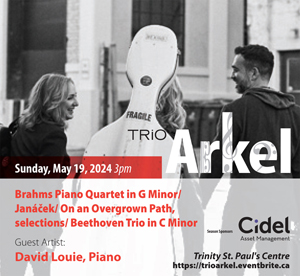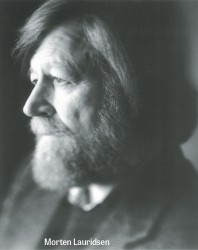 This month I will write in depth about two exciting projects taking place in the coming weeks. First, I will expand on September’s column, which included a brief mention of Morten Lauridsen’s visit to Toronto, which will take place on Saturday October 25.
This month I will write in depth about two exciting projects taking place in the coming weeks. First, I will expand on September’s column, which included a brief mention of Morten Lauridsen’s visit to Toronto, which will take place on Saturday October 25.
Lauridsen is a choral giant, one of the few extant. While England’s John Rutter may still enjoy a comparable degree of international popularity, I’d argue that Lauridsen music, often as accessible as a mainstream film score (Lauridsen founded USC Thornton School of Music’s program in film scoring), has a meditative, introspective quality that is rarely found in Rutter’s cheerful compositions.
Lauridsen can employ spiky-sounding modern tonal idioms, but more often approaches composition from the angle of choral liturgical music, which tends to value audience connection over formal innovation (the closest Canadian equivalent is probably the late Srul Irving Glick, whose Jewish liturgical music has a similar aesthetic).
Not surprisingly, Lauridsen’s music is very popular with church, school and community choirs. His most famous pieces combine spacious melodic intervals of fifths and fourths that give a distant echo of Sacred Harp part songs, with dense chordal writing containing the gentlest of dissonances.
Lauridsen’s visit to Toronto is a joint project combining the efforts and participation of the U of T MacMillan Singers, Orpheus Choir of Toronto, Yorkminster Park Baptist Church Choir, Exultate Chamber Singers and the Cawthra Park Secondary School Chamber Choir. Lauridsen will perform with these groups in a gala concert of his music. There will also be a Q & A session, and a screening of Shining Night, a documentary about the composer. For information and tickets, please visit lauridsenevent.com.
(For those who would like an early taste of Lauridsen’s work alongside that of other composers, catch the Elmer Iseler Singers in their “The Spirit Sings!” concert on October 5.)
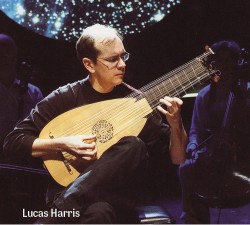 Harris takes on TCC: October’s other project of note is the new direction being taken by the Toronto Chamber Choir. The TCC was founded in 1968 by Annagret Wright, and for over 20 years was conducted by David Fallis, leader of the Toronto Consort, and one of the pre-eminent specialists in early music in the region.
Harris takes on TCC: October’s other project of note is the new direction being taken by the Toronto Chamber Choir. The TCC was founded in 1968 by Annagret Wright, and for over 20 years was conducted by David Fallis, leader of the Toronto Consort, and one of the pre-eminent specialists in early music in the region.
Beginning this season, the TCC has engaged a new conductor who is also an early music specialist – lutenist Lucas Harris, who has recently made the leap from instrumental playing to conducting. He plays regularly with the Toronto Consort and the Tafelmusik Baroque Orchestra.
Harris, like Fallis, is one of the most knowledgeable and accomplished early music specialists in the country (full disclosure – Harris is a friend and colleague from whom I purchased my first lute). Though relatively new to conducting, he is a very good fit for the TCC, whose artistic mandate is music of the baroque and earlier eras.
Harris writes about the process of becoming a conductor: “I got interested in conducting because there is a special satisfaction about taking the responsibility for a project at every stage, from the initial idea to the concert itself. After spending two and a half years hanging out with singers, singing alongside them in choir, taking classes with them, I can say that singing requires way more intelligence and skill than I knew.
“In the renaissance and early baroque the ideal was that instruments should imitate the perfection of the human voice. One thing that I’d wish for in the early music scene is to establish a more definable path for young singers who want to become my favourite type of singer: one that is interested in a subtle, dynamically nuanced style of phrasing which is intimately connected to the text. I’m trying to do my part to help encourage singers who are tending this way by creating the new Toronto Chamber Consort, which is the TCC’s new section lead program.”
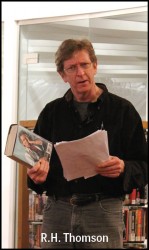 Harris’ inaugural program with the TCC, “Air, Fire, Earth & Water: The Renaissance Sense of Humour(s),” takes place on the afternoon of November 2. R.H. Thomson, one of Canada’s finest actors, collaborates with the choir in a musical investigation of the the word humour, which had a different meaning in renaissance times than it does now.
Harris’ inaugural program with the TCC, “Air, Fire, Earth & Water: The Renaissance Sense of Humour(s),” takes place on the afternoon of November 2. R.H. Thomson, one of Canada’s finest actors, collaborates with the choir in a musical investigation of the the word humour, which had a different meaning in renaissance times than it does now.
Back in the day, humour was actually a medical term. According to Harris, humourism was the idea that “our temperaments and moods [were] determined by the balance of four bodily liquids” that corresponded to emotional states, or humours. Blood equalled sanguine – playful, carefree; yellow bile equalled choleric – restless, volatile; black bile equalled melancholic – introspective, melancholy; phlegm equalled phlegmatic – calm, thoughtful. Each of the four humours also had a related natural element as well as a corresponding colour, season, planet and time of day. Thomson’s script will investigate our attempts to rationalize the mysteries of human nature through science, questioning if our modern systems of classification are any closer to the truth than the methods of our ancestors.
What we think of as humour these days was often termed “comedy” back then, and renaissance folk enjoyed a good (and frequently, dirty) joke just as much as we do now. The TCC’s program has examples of music that investigates bawdy, bodily and spiritual humour(s), from diverse renaissance sources: Italian and Flemish madrigals, English lute songs and French chansons. I would certainly recommend this program to concertgoers as a chance to be a part of the beginning of an exciting new chapter in the life of this Toronto choir.
Elora Festival Singers: Spirituals and gospel songs from the African-American tradition are often conflated. While there is plenty of overlap, they are not the same thing. Spirituals are an older body of repertoire that can be traced back as far as the early 19th century, and likely existed much earlier. On October 19 the Elora Festival Singers perform “Spirituals and Folksongs” in Elora with guest vocalist Jackie Richardson. Richardson is an engaging, generous performer, at home with gospel, spirituals and pretty much everything else.
TMC’s 120th!: On October 15 a very special occasion in Toronto’s choral life takes place – a celebration of the Toronto Mendelssohn Choir’s 120th anniversary. The TMC was founded by 1894 by Augustus Stephen Vogt and William Henry Hewlett, the sons of European immigrants who helped foster the European concert music tradition at a time when Toronto was still practically a small town. The torch was carried by Sir Ernest MacMillan, probably Canada’s first real musical superstar, who conducted the choir from 1942 to 1957.
The dynamic and mercurial “dean of Canadian conductors,” Elmer Isler, conducted the TMC from 1964 to 1997. The Elora Festival Singers’ Noel Edison has led the ensemble up to the current day, continuing to marshall the forces necessary for a grand style of music making (the choir is over 100 voices strong) that continues to speak strongly to audiences. The anniversary concert features two classical favourites, Haydn’s Lord Nelson Mass and Mozart’s unfinished D Minor Requiem.
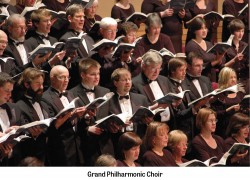 Gerontian Forces: On October 30 and November 1 the Amadeus Choir and Elmer Iseler Singers provide the vocal forces for the Toronto Symphony Orchestra’s performance of Elgar’s The Dream of Gerontius. Elgar (1857-1934) is often best known for his Pomp and Circumstance March No.1 which contains the familiar “Land of Hope and Glory” tune.
Gerontian Forces: On October 30 and November 1 the Amadeus Choir and Elmer Iseler Singers provide the vocal forces for the Toronto Symphony Orchestra’s performance of Elgar’s The Dream of Gerontius. Elgar (1857-1934) is often best known for his Pomp and Circumstance March No.1 which contains the familiar “Land of Hope and Glory” tune.
This catchy melody is always – always – played at British-style Proms concerts, which gives listeners the impression that Elgar’s compositions are musical expressions of British imperialism. British what? For you youngsters out there, there was actually a time when Britannia ruled the waves, so Britannia waived the rules, and – oh, forget it. Just Google it, okay?
Elgar, like his colleagues Holst and Vaughan Williams, was anything but an imperialist. He had a mystical, solitary side, like many artists, and as a Roman Catholic and self-taught musician, felt himself to be an outsider in the circles that dominated English musical life. The Dream of Gerontius is a searching, deeply felt work that delineates the journey of one man’s soul from his deathbed to God and eventual judgement.
Others of Note: (For those who would like another opportunity to hear more English music, the Pax Christi Chorale performs “Blest Pair of Sirens – A Celebration of Voice and Verse” on October 19. Music includes selections by Parry, Elgar and Canada’s foremost exponent of the English cathedral tradition, Healy Willan. Pax Christi is joined by the Aslan Boys Choir. )
On October 25 York University hosts “G.I.V.E,” or the “Gospel Inter-Varsity Explosion.” As someone who actively shunned all team sports in university, this is the kind of collegiate enterprise I could get behind. The York, McMaster and University of Toronto gospel choirsare joined by Karen Burke’s terrific Toronto Mass Choir, and all these energetic groups can be heard for the absurdly low sum of five dollars, which redefines the phrase “extreme bargain.”
If you happen to be in Kitchener around that time, you could opt instead for the Grand Philharmonic Choir’s performance of Orff’s Carmina Burana, on October 24 and 25. The GPC join with their children’s choir and TorQ Percussion Quartet for Orff’s perennial crowd-pleaser.
For those who want to see how the next generation of choral singers is faring, St. Michael’s Choir School performs “For All the Saints: Annual Founder’s Day Concert” on October 17 and the Toronto Children’s Chorus Training Choirs and Choral Scholars perform “Seasonal Splendours” on October 25.
On November 7 the choirs of the Ontario Christian Music Assembly join together for their “Christian Festival Concert” at Roy Thomson Hall, with guests the Toronto Brass Quintet.
I missed a few choirs in this column, for which I apologize – make sure to check ’em out in the listings. See you next month!
Benjamin Stein is a Toronto tenor and lutenist.
He can be contacted at
choralscene@thewholenote.com.
Visit his website at benjaminstein.ca.



